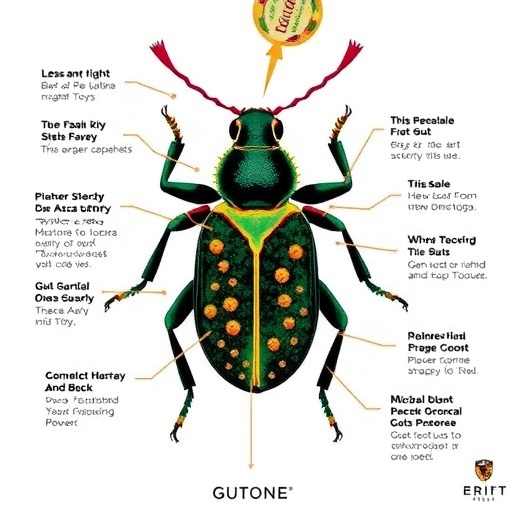Unlocking the Secrets of Bark Beetles: A Deep Dive into the Gut Microbiome of Dendroctonus rhizophagus
In the intricate world of entomology, bark beetles stand out due to their ecological and economic significance. A recent study sheds light on the gut microbiome of the bark beetle species Dendroctonus rhizophagus, revealing insights into how these insects manage to survive and thrive in their wood-based habitats. This study, credited to the combined efforts of researchers K. Vazquez-Ortiz, F.N. Rivera-Orduña, and G. Zúñiga, makes a remarkable contribution to our understanding of microbial life within one of nature’s most resilient beetles.
Traditionally, the bark beetle’s role has primarily been discussed in the context of forest ecology and management, often emphasizing its significant impact on tree health. However, the microbial communities inhabiting their gut are beginning to receive more attention. The study indicates that these native microbial populations play crucial roles in digesting complex plant materials and, importantly, in detoxifying harmful compounds found within their wood-based diet.
Utilizing cutting-edge comparative genomics, the research delves into the specific microbial consortia that reside within the intestines of Dendroctonus rhizophagus. By sequencing and analyzing the genomes of these dominant gut microbes, the authors reveal novel genetic pathways that facilitate the breakdown of tough cellulose and hemicellulose fibers. This enzymatic capability is fundamental to the bark beetle’s ability to derive nutrients from wood, which is otherwise indigestible.
The implications of these findings extend beyond mere digestion. The presence of distinct microbial taxa allows the bark beetle to detoxify compounds that are toxic to both them and their surrounding flora. The study highlights the intricacies of functional complementarity, wherein different microbial species collaborate to enhance the beetle’s overall extraction of nutrients while concurrently neutralizing harmful substances. This symbiotic relationship paints the gut microbiome as an evolutionary asset that grants Dendroctonus rhizophagus a competitive edge.
Moreover, the genetic data reveal a diverse repertoire of enzymes and transport proteins that equip the gut microbes with the means to process various xenobiotic compounds. The newfound knowledge showcases the potential of these microbes to degrade environmental pollutants, opening avenues for bioremediation approaches that leverage microbial capabilities. This adaptability positions Dendroctonus rhizophagus and its microbiome as a dynamic model for studying symbiosis and adaptation in challenging environments.
The research does not just stop at the ecological implications; it also touches on broader themes of microbial co-evolution and host adaptation. The genetic exchanges among the community could facilitate rapid evolutionary responses to environmental pressures, creating a feedback loop that influences both the microbiome and its bark beetle host. Insights from this research could provide critical evidence in understanding microbial evolution in association with hosts that are subjected to rapid ecological changes.
Interestingly, the study’s authors posit that the functional trait diversity observed within the gut microbiome mirrors a mini-ecosystem, suggesting that similar communities may be at play in other wood-feeding insects. This could lead to broader questions regarding the conservation of such microbial consortia and their roles in forest ecosystems, serving as indicators of ecological health and resilience.
The implications for pest management strategies become increasingly apparent. Understanding how bark beetles utilize their microbial partners to thrive in often hostile environments can lead to more effective management techniques. Strategies fostering microbial resilience or introducing beneficial microbes might provide new ways to deter bark beetle infestations, which have been problematic in many forested regions due to climate change and forest stressors.
While the study emphasizes the gut microbiome’s intriguing role, it also reinforces the necessity for further research. The diversity of microbial species within the beetle’s gut begs the question of how these communities interact with one another and wrench a better understanding of functional dynamics. Future research endeavors may explore the relationships further, potentially illuminating other microbial interactions that contribute to bark beetle ecology and resilience.
In summary, the findings from Vazquez-Ortiz, Rivera-Orduña, and Zúñiga represent not just an academic exploration but a new lens through which we can understand the vital role of microbiomes in ecological interactions. The complex interplay between Dendroctonus rhizophagus and its gut microbiome showcases the marvels of evolution, adaptation, and cooperation within ecosystems that are often perceived as simple or linear.
In conclusion, this research opens up exciting pathways in both entomological research and microbial ecology. As the world continues to grapple with environmental challenges, the study of beetles like Dendroctonus rhizophagus and their microbiomes stands as a testament to nature’s ingenuity and resilience. The potential applications of these findings stretch into areas such as sustainability, conservation biology, and even biotechnology, as scientists strive to harness the power of microbes in ways that benefit both nature and humanity. We are just beginning to scratch the surface of this intricate relationship, and the prospects for future discoveries remain boundless.
Subject of Research: Comparative genomics of gut microbiome in bark beetles
Article Title: Comparative genomics of dominant members of the gut core microbiome of the bark beetle, Dendroctonus rhizophagus (Curculionidae: Scolytinae) reveals potential functional complementarity in the detoxification process.
Article References:
Vazquez-Ortiz, K., Rivera-Orduña, F.N. & Zúñiga, G. Comparative genomics of dominant members of the gut core microbiome of the bark beetle, Dendroctonus rhizophagus (Curculionidae: Scolytinae) reveals potential functional complementarity in the detoxification process.
BMC Genomics 26, 1064 (2025). https://doi.org/10.1186/s12864-025-12279-1
Image Credits: AI Generated
DOI: https://doi.org/10.1186/s12864-025-12279-1
Keywords: gut microbiome, bark beetle, Dendroctonus rhizophagus, comparative genomics, detoxification, microbial ecology.




